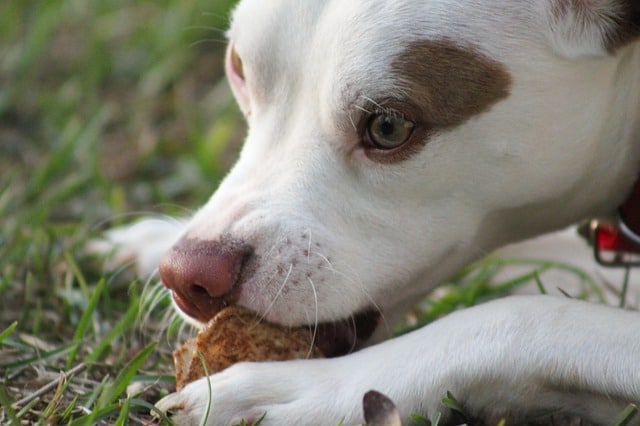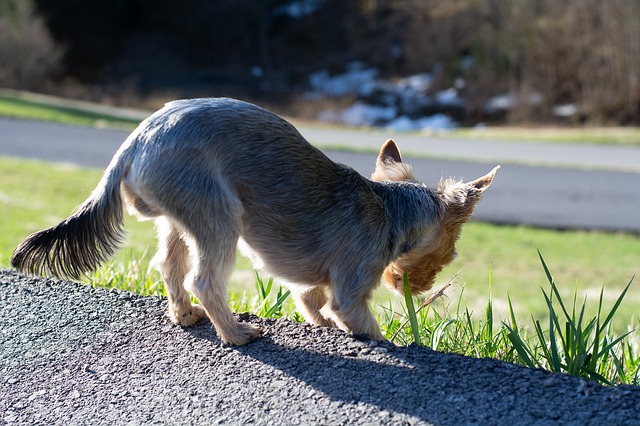Watching your little fur baby calmly and deliberately nibble poop is horrifying and nauseating.
Unfortunately, most dogs eat poop at some point in their lives. In fact, according to a past 2012 study, 24% of dogs have been observed feasting on feces at least once.
While eating poop is repulsive to you, it is not that bad from your pooch’s point of view. Besides, it is not necessarily detrimental to your dog’s health unless he consumes poop from other animals that are contaminated with parasites, viruses, and toxins.
The good news is, breaking your dog off this practice is possible. There are some techniques you can leverage to stop this disgusting and potentially dangerous behavior.
For instance, there are several products and home remedies that you can put in your dog food to stop your dog from eating poop.
While some of these products and remedies may not be effective without training and may not work for all dogs, they have produced amazing results for some dog parents and they will not harm your dog to try.
Without further ado, here is a quick overview of the things you can put in your dog food to stop him from eating poop:
1.Dog Multivitamins
It is believed that one of the reasons why dogs love eating poop is because they are missing certain nutrients or vitamins in their diets.
B vitamins deficiency, in particular, has been a prime suspect. Adding B vitamins to your dog’s diet can, therefore, help stop his coprophagic behavior.
Tuck the vitamins in foods you plan to give your dog as treats after meals.
Consider giving 1/8 tablets a day for 25-30 pounds dog, ¼ tablets a day for a 30-60 pounds dog, and ½ tablets a day for larger breeds.
Repeat this for 1-2 weeks until your dog stops the behavior.
2. Digestive Supplements
Dry dog food, canned food, raw food, or homemade dog food may not contain all the digestive enzymes that your dog needs to maintain a healthy digestive system.
And a dog with poor digestion cannot assimilate food well and will look for digestive enzyme supplementation from other sources, including poop.
Adding digestive supplements to your dog’s food can help your dog stop his poop-eating behavior because the supplements aid digestion and assimilation of nutrients.
Here are some excellent digestive enzymes that can allow your dog’s gut to absorb more nutrients and ultimately stop the coprophagic behavior:
- Raw Honey (moderate amounts as honey is high in sugar)
3. Meat Tenderizers
Some dogs eat poop simply because they like the taste.
Sprinkling a meat tenderizer over your dog’s food will change the taste of the poop after it is expelled, creating an unpleasant smell and taste for your dog’s senses.
You can get meat tenderizers from your local grocery store.
Although people believe that meat tenderizers that can help your dog stop eating poop must contain MSG—a food additive with a characteristic metallic taste, which can be discouraging to a poop eater—you should note that some canine experts believe that MSG may be harmful to some dogs.
To err on the side of caution, opt for options like Adolphs Meat Tenderizers, which has no MSG and contains no artificial flavors or colors but will still help deter your dog from eating his poop.
Learn more here: Meat Tenderizer in Dog Food: All FAQs answered
4. Apple Cider Vinegar (ACV)
Your dog may also eat poop because he has hydrochloric acid deficiency caused by poor diet or aging.
For starters, hydrochloric acid is often used to break down proteins in your dog’s body.
So, a dog that doesn’t have enough hydrochloric acid may not be able to digest his food well and the food will just pass through. This means that your dog will be attracted to his poop because he can find some nutrients in the poop.
To ensure that your dog’s food is well-digested, consider adding apple cider vinegar to his food.
About a teaspoon of ACV per 25 pounds of your dog’s weight should suffice.
ACV will aid food digestion, which means that the poop being eliminated will lack the yummy factor and will not be tempting to eat.
5. Pineapple
Adding a few chunks of pineapple in dog food has also been shown to break the habit of eating poop.
Pineapple is rich in an enzyme called bromelain, which not only plays a vital role in digesting protein in your dog’s system but can also make his poop taste horrible, deterring him from eating it.
Other people also believe that the acidity in pineapple changes the taste of a dog’s poop, making it less appetizing.
Pineapple is good for most dogs but it is high in fiber and sugar, so only feed your dog small quantities so that it doesn’t adversely affect his digestive system.
The spiky skin of pineapples can also cause choking or blockages, so only add the soft flesh to your dog’s food.
6. Pumpkin
Like pineapple, adding unspiced, canned pumpkin to your dog food apparently alters the taste of his poop, making it less palatable to him.
Besides helping your dog break his coprophagic habit, a pumpkin will help both constipation and diarrhea and may go a long way in promoting urinary tract health.
Related Post: How Much Pumpkin Should You Give a Dog For Constipation?
7. Probiotics

Dogs are also believed to eat their poops because the stools contain beneficial bacteria.
Lactobacillus acidophilus, for instance, resides in your dog’s gut and aids digestion, bolster his immune system, and fight off pathogens.
It is believed that Lactobacillus acidophilus and other beneficial microbes are often shed in poop and that’s why dogs may opt to eat their poops from time to time—to replenish their supply of these bacteria.
By feeding your dog probiotics that contain these microbes, you will be mimicking what’s in his feces, discouraging him from eating his poop.
You will also be adding beneficial bacteria to your dog’s system at the same time.
Bored puppies may also become curious and begin playing and eating their feces.
Anxiety probiotics or supplements may come in handy in such instances as they can help calm anxiety.
8. Green Veggies
Depending on your dog’s diet, the undigested matter in his poop may be rich in fiber. So, there are instances when your dog may crave for poop to get some fiber.
By adding green veggies like spinach or minced broccoli, you will not only be mimicking what is in his stool but you will also be offering him something that he craves.
9. Dietary Fat
Dog poop has some fat in it. So, adding some dietary fat—assuming your dog can tolerate small amounts—can go a long way in breaking the poop eating behavior because it somehow replicates what your dog may find tempting in his poop.
Most dog owners vouch for coconut oil due to the fact that it is metabolized differently.
Add ¼ tablespoon of per 15 pounds body weight of organic, cold-pressed coconut oil for 1-2 weeks until your dog stops his poop-eating fetish.
10. Cooked Grain
Since some dogs are attracted to poop that contains undigested grains, hulls, and husks, adding a small amount of overcooked grains like brown rice or quinoa can also help break the coprophagic behavior.
Ensure that you rinse brown rice and quinoa before cooking to remove dust or debris or bitter coating in quinoa.
Related Post: Is Quinoa Good for Dogs?
11. OTC Deterrents
Lastly, there is a wide range of off-the-shelf deterrents that may also come in handy.
Like the home remedies and supplements we have highlighted in this post, the deterrents make your dog’s poop taste really bad, making it less palatable.
Check the post below for the best options in the market today:
The Bottom line
Hopefully, now you know what to put in dog food to stop eating poop.
While the vitamins, supplements, and home remedies we have highlighted are essential for your dog’s health, some of them may have detrimental effects on your dog’s health when given in excess.
Accordingly, always involve your vet whenever you plan to adjust your pup’s diet.
You should also ensure that your dog is not allergic to ingredients in these foods before using any of them.
Furthermore, always remember that your dog is different, so don’t expect that what has worked for your friend’s dog will automatically work for your pooch.
If one remedy doesn’t seem to give the results that you need, switch to another.
As an Amazon Associate, we may receive a small commission from qualifying purchases but at no extra cost to you. Learn more. Amazon and the Amazon logo are trademarks of Amazon.com, Inc, or its affiliates.

